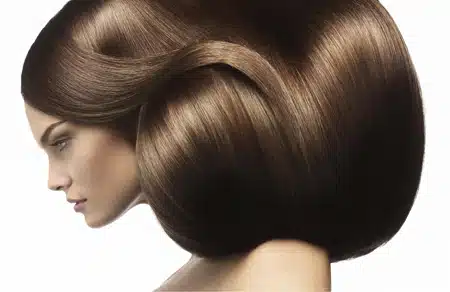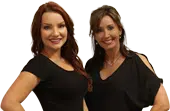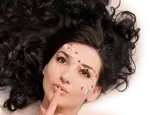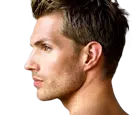Exercising and a healthy diet will help you have thick, great-looking hair.
“Exercise increases the blood supply to your muscles as well as your hair, which stimulates growth,” says Jim White, R.D., a spokesperson for the American Dietetic Association. “And the foods we eat for muscle also promote hair health.”
“Your hair grows about 1/4 to 1/2 inch every month, and the foundation of all of our new hair, skin and nail growth is the nutrients we eat,” says dietitian Dawn Jackson Blatner. “If you eat a healthy diet, you will grow stronger and healthier cells throughout your entire body — inside and out.”
Just be sure you’re eating a balanced diet. “Your body has a priority system,” says Amy Newburger, M.D., director of Dermatology Consultants of Westchester in Scarsdale, New York. “If it only has a limited number of nutrients, your body sends those nutrients to the cells essential for life. So your hair is one of the first type of cells to go.”
If you were born with fine, thin hair, you’ll never have rope-thick tresses – no matter what you eat – but a well-balanced diet that includes plenty of protein and iron can make a difference, say nutrition and hair experts.
Keep your hair (and entire body) healthy by including these nutrients in your daily diet.
Protein
You know you need adequate protein to build muscle—and you also need it for healthy hair because hair is made primarily of protein. Low-quality protein can lead to weak, brittle hair or a loss of hair color—but chances are, if you’re trying to add or maintain muscle, you already eat enough. Because hair is nearly all protein, “foods rich in protein are literally giving you the building blocks for hair,” says New York nutritionist Lisa Drayer, MA, RD, author of The Beauty Diet.
Good sources: Chicken, turkey, beef, eggs, low-fat dairy (cottage cheese, milk, yogurt)
Iron
Low iron levels can lead to baldness, according to a Cleveland Clinic review. Researchers looked at 11 studies on the relationship between iron intake and hair loss, and concluded that treating iron deficiency may help regrow hair. “Iron is especially important, because it helps cells carry oxygen to the hair follicles, and too little iron (anemia) is a major cause of hair loss, particularly in women”, Drayer says. To help your body absorb iron, you’ll need enough vitamin C.
Good sources: Lean red meat, turkey, egg yolks, dried beans, dried fruit, whole grains
Zinc
Shedding more often? You may need to increase your intake of zinc. Studies show this mineral can affect levels of androgens, hormones associated with hair loss. Zinc also keeps your hair, nails and eyes healthy.
Good sources: Oysters, nuts (walnuts, cashews, pecans, almonds), beans, beef, lamb
Omega-3 Fatty Acids
“Essential omega-3 fatty acids are needed to support scalp health,” says dietician Andrea Giancoli. Studies suggest a deficiency can result in a dry scalp and dull hair.
“Your body can’t make those fatty acids, which your body needs to grow hair. About 3% of the hair shaft is made up of these fatty acids”, says Drayer. Omega-3s are also found in cell membranes in the skin of your scalp, and in the natural oils that keep your scalp and hair hydrated.
Good sources: Salmon, sardines, herring, mackerel, flaxseeds, walnuts
Lignans
In a 6-month pilot study, Taiwanese scientists found that lignans—disease-fighting compounds found in flaxseed—may help slow hair loss. Nine of the 10 men in the study reported modest to much improvement in the number of hairs shed daily.
Good source: Flaxseed. Lignans are found in the flaxseed’s shell, so buy ground whole seeds in your supermarket’s health-food section. The men in the study consumed 1 1/2 tablespoons a day. Try adding flaxseed to oatmeal or smoothies.
Water
If you have dry hair—or just want to prevent straw-like strands—drink more water. “Hair is one-quarter water,” White says. He recommends the typical eight glasses a day. Bring a water bottle to work so you don’t spend the entire day refilling your mug at the fountain.
Vitamin C
Collagen surrounds the hair strands but as we age, collagen breaks down, causing hair to be more vulnerable to breaking. The best way to boost collagen is not through some expensive medical procedure, it’s by getting more vitamin C. Vitamin C helps your body absorb iron, so a deficiency can make hair dry and weak. You likely take in enough C from your diet, as long as you eat a variety of fruits and vegetables daily. C is critical for circulation to the scalp and supports the tiny blood vessels that feed the follicles. Too little C in your diet can lead to hair breakage.
Good sources: Broccoli, leafy greens, green peppers, citrus fruit, strawberries
Biotin
Biotin, a water soluble vitamin of the B complex, encourages hair and scalp health. “A lack of adequate biotin can lead to brittle hair, but deficiencies are rare”, White says. This vitamin will help you have thick hair as well as strong nails.
Good sources: Brown rice, legumes, lentils, eggs, Swiss chard, nuts, oats






